英语二教材
- 格式:doc
- 大小:181.50 KB
- 文档页数:38
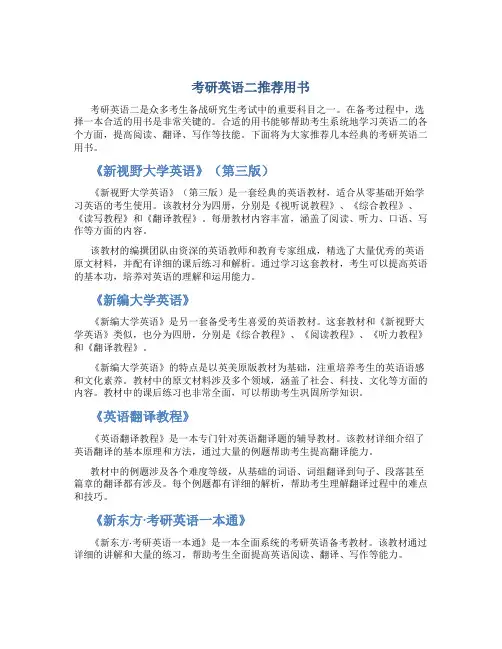
考研英语二推荐用书考研英语二是众多考生备战研究生考试中的重要科目之一。
在备考过程中,选择一本合适的用书是非常关键的。
合适的用书能够帮助考生系统地学习英语二的各个方面,提高阅读、翻译、写作等技能。
下面将为大家推荐几本经典的考研英语二用书。
《新视野大学英语》(第三版)《新视野大学英语》(第三版)是一套经典的英语教材,适合从零基础开始学习英语的考生使用。
该教材分为四册,分别是《视听说教程》、《综合教程》、《读写教程》和《翻译教程》。
每册教材内容丰富,涵盖了阅读、听力、口语、写作等方面的内容。
该教材的编撰团队由资深的英语教师和教育专家组成,精选了大量优秀的英语原文材料,并配有详细的课后练习和解析。
通过学习这套教材,考生可以提高英语的基本功,培养对英语的理解和运用能力。
《新编大学英语》《新编大学英语》是另一套备受考生喜爱的英语教材。
这套教材和《新视野大学英语》类似,也分为四册,分别是《综合教程》、《阅读教程》、《听力教程》和《翻译教程》。
《新编大学英语》的特点是以英美原版教材为基础,注重培养考生的英语语感和文化素养。
教材中的原文材料涉及多个领域,涵盖了社会、科技、文化等方面的内容。
教材中的课后练习也非常全面,可以帮助考生巩固所学知识。
《英语翻译教程》《英语翻译教程》是一本专门针对英语翻译题的辅导教材。
该教材详细介绍了英语翻译的基本原理和方法,通过大量的例题帮助考生提高翻译能力。
教材中的例题涉及各个难度等级,从基础的词语、词组翻译到句子、段落甚至篇章的翻译都有涉及。
每个例题都有详细的解析,帮助考生理解翻译过程中的难点和技巧。
《新东方·考研英语一本通》《新东方·考研英语一本通》是一本全面系统的考研英语备考教材。
该教材通过详细的讲解和大量的练习,帮助考生全面提高英语阅读、翻译、写作等能力。
教材中的内容包括英语单词、词组、阅读理解、完形填空、翻译和写作等多个方面。
每个知识点都有详细的讲解和练习,让考生从基础到高级逐步提高。
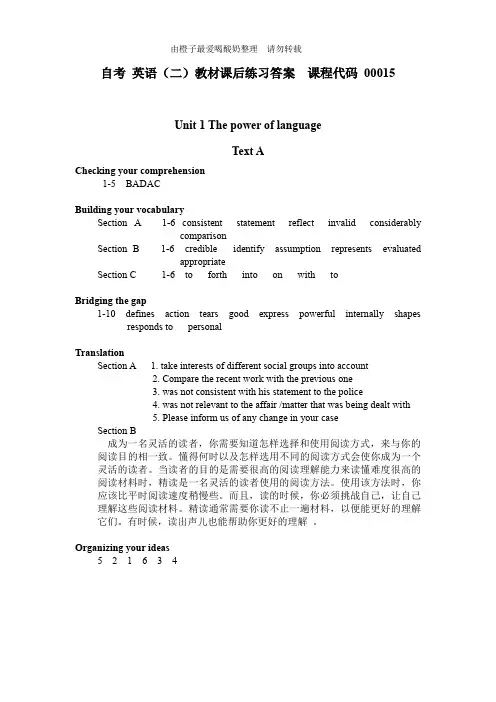
自考英语(二)教材课后练习答案课程代码00015Unit 1 The power of languageText AChecking your comprehension1-5 BADACBuilding your vocabularySection A 1-6 consistent statement reflect invalid considerablycomparisonSection B 1-6 credible identify assumption represents evaluatedappropriateSection C 1-6 to forth into on with toBridging the gap1-10 defines action tears good express powerful internally shapes responds to personalTranslationSection A 1. take interests of different social groups into account2. Compare the recent work with the previous one3. was not consistent with his statement to the police4. was not relevant to the affair /matter that was being dealt with5. Please inform us of any change in your caseSection B成为一名灵活的读者,你需要知道怎样选择和使用阅读方式,来与你的阅读目的相一致。
懂得何时以及怎样选用不同的阅读方式会使你成为一个灵活的读者。
当读者的目的是需要很高的阅读理解能力来读懂难度很高的阅读材料时,精读是一名灵活的读者使用的阅读方法。
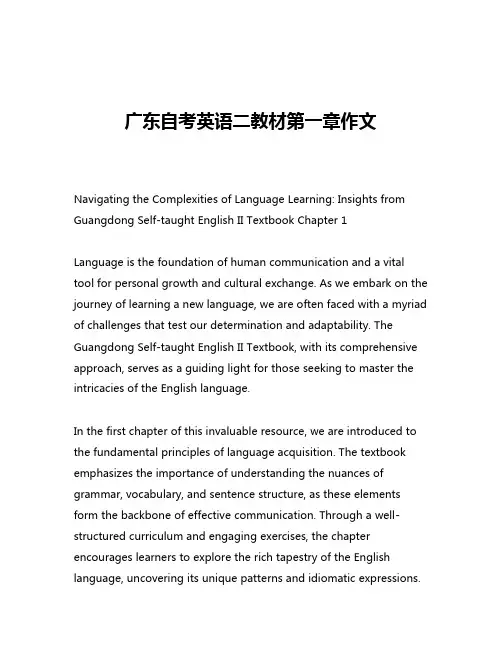
广东自考英语二教材第一章作文Navigating the Complexities of Language Learning: Insights from Guangdong Self-taught English II Textbook Chapter 1Language is the foundation of human communication and a vital tool for personal growth and cultural exchange. As we embark on the journey of learning a new language, we are often faced with a myriad of challenges that test our determination and adaptability. The Guangdong Self-taught English II Textbook, with its comprehensive approach, serves as a guiding light for those seeking to master the intricacies of the English language.In the first chapter of this invaluable resource, we are introduced to the fundamental principles of language acquisition. The textbook emphasizes the importance of understanding the nuances of grammar, vocabulary, and sentence structure, as these elements form the backbone of effective communication. Through a well-structured curriculum and engaging exercises, the chapter encourages learners to explore the rich tapestry of the English language, uncovering its unique patterns and idiomatic expressions.One of the key insights gleaned from this chapter is the significance of active engagement in the learning process. The textbook underscores the need for learners to immerse themselves in the language, actively participating in conversations, reading extensively, and practicing regularly. This hands-on approach not only reinforces the concepts introduced in the chapter but also fosters a deeper understanding of the language's practical applications.Moreover, the chapter delves into the importance of cultural awareness in language learning. It acknowledges that language is inextricably linked to the cultural context in which it is used, and that successful communication requires a nuanced understanding of cultural norms, customs, and social etiquette. By emphasizing the need to explore the cultural aspects of the English-speaking world, the textbook encourages learners to develop a more well-rounded perspective and to navigate the intricacies of cross-cultural interactions with confidence.Another crucial aspect highlighted in the chapter is the role of effective study strategies. The textbook provides guidance on time management, goal-setting, and the utilization of various learning resources, empowering learners to take a proactive approach to their language acquisition journey. By equipping students with practical tools and techniques, the chapter fosters a sense of self-directedlearning, enabling them to overcome challenges and achieve their language proficiency goals.Furthermore, the chapter delves into the importance of building a strong foundation in the four core language skills: listening, speaking, reading, and writing. It emphasizes the need to develop a balanced approach, dedicating time and effort to each skill area to ensurewell-rounded language proficiency. The textbook offers a structured framework for skill development, incorporating a variety of exercises and activities that cater to different learning styles and preferences.One of the standout features of this chapter is its emphasis on the role of technology in language learning. The textbook acknowledges the transformative impact of digital resources, such as online language learning platforms, interactive applications, and multimedia content, in enhancing the learning experience. By integrating technology-based tools and strategies, the chapter encourages learners to leverage the power of digital resources to supplement their traditional learning methods and to stay engaged and motivated throughout their language journey.In addition to the technical aspects of language acquisition, the chapter also addresses the psychological and emotional challenges that often accompany the learning process. It recognizes the importance of developing a growth mindset, where learners viewobstacles as opportunities for growth and embrace the challenges that come with mastering a new language. The textbook provides guidance on building resilience, managing stress, and maintaining a positive attitude, empowering learners to overcome setbacks and remain steadfast in their pursuit of language proficiency.As learners delve into the first chapter of the Guangdong Self-taught English II Textbook, they are presented with a comprehensive and well-structured approach to language learning. The chapter's emphasis on grammar, vocabulary, cultural awareness, effective study strategies, and the integration of technology serves as a solid foundation for learners to build upon. By embracing the insights and recommendations provided in this chapter, students can embark on a transformative journey, where they not only develop their linguistic skills but also cultivate a deeper appreciation for the richness and diversity of the English language.In conclusion, the first chapter of the Guangdong Self-taught English II Textbook is a valuable resource for anyone seeking to enhance their English language proficiency. Through its holistic approach, the chapter equips learners with the tools and strategies necessary to navigate the complexities of language learning, fostering a sense of confidence, adaptability, and cultural awareness. As learners progress through the textbook, they will undoubtedly find themselves empowered to communicate effectively, engage in meaningful cross-cultural exchanges, and ultimately, unlock the vast potential of the English language.。
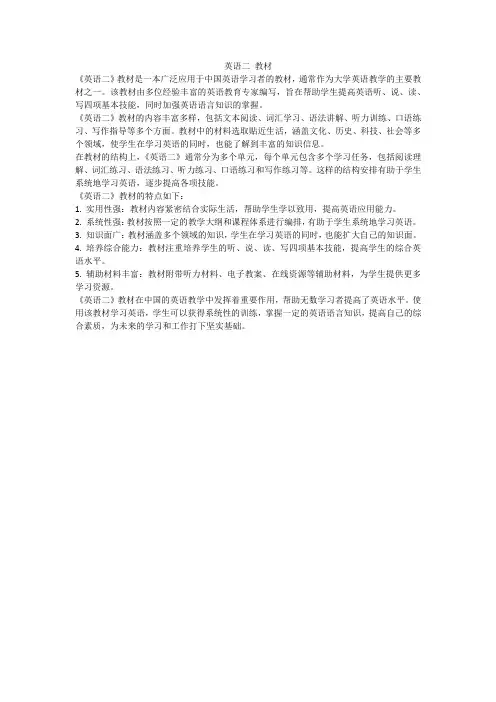
英语二教材
《英语二》教材是一本广泛应用于中国英语学习者的教材,通常作为大学英语教学的主要教材之一。
该教材由多位经验丰富的英语教育专家编写,旨在帮助学生提高英语听、说、读、写四项基本技能,同时加强英语语言知识的掌握。
《英语二》教材的内容丰富多样,包括文本阅读、词汇学习、语法讲解、听力训练、口语练习、写作指导等多个方面。
教材中的材料选取贴近生活,涵盖文化、历史、科技、社会等多个领域,使学生在学习英语的同时,也能了解到丰富的知识信息。
在教材的结构上,《英语二》通常分为多个单元,每个单元包含多个学习任务,包括阅读理解、词汇练习、语法练习、听力练习、口语练习和写作练习等。
这样的结构安排有助于学生系统地学习英语,逐步提高各项技能。
《英语二》教材的特点如下:
1. 实用性强:教材内容紧密结合实际生活,帮助学生学以致用,提高英语应用能力。
2. 系统性强:教材按照一定的教学大纲和课程体系进行编排,有助于学生系统地学习英语。
3. 知识面广:教材涵盖多个领域的知识,学生在学习英语的同时,也能扩大自己的知识面。
4. 培养综合能力:教材注重培养学生的听、说、读、写四项基本技能,提高学生的综合英语水平。
5. 辅助材料丰富:教材附带听力材料、电子教案、在线资源等辅助材料,为学生提供更多学习资源。
《英语二》教材在中国的英语教学中发挥着重要作用,帮助无数学习者提高了英语水平。
使用该教材学习英语,学生可以获得系统性的训练,掌握一定的英语语言知识,提高自己的综合素质,为未来的学习和工作打下坚实基础。
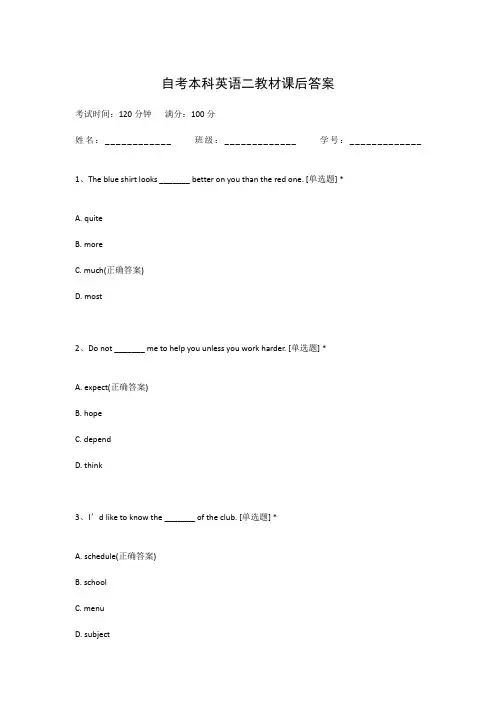
自考本科英语二教材课后答案考试时间:120分钟满分:100分姓名:____________班级:_____________学号:_____________1、The blue shirt looks _______ better on you than the red one. [单选题] *A. quiteB. moreC. much(正确答案)D. most2、Do not _______ me to help you unless you work harder. [单选题] *A. expect(正确答案)B. hopeC. dependD. think3、I’d like to know the _______ of the club. [单选题] *A. schedule(正确答案)B. schoolC. menuD. subject4、I’ve got some very _______ news to tell you. [单选题] *A. exciting(正确答案)B. comfortableC. convenientD. beautiful5、Let us put the matter to the vote,()? [单选题] *A. will youB. can weC. may ID. shall we(正确答案)6、This is _________ my father has taught me—to always face difficulties and hope for the best. [单选题] *A. howB. whichC. that(正确答案)D. what7、Modern plastics can()very high and very low temperatures. [单选题] *A. stand(正确答案)B. sustainC. carryD. support8、The classmates can' t()Alice from her twin sister. [单选题] *A. speakB. tell(正确答案)C. talkD. say9、Once you get on the road, here are some traffic _______ to remember. [单选题] *A. problemsB. positionsC. rules(正确答案)D. points10、I think _______ is nothing wrong with my car. [单选题] *A. thatB. hereC. there(正确答案)D. where11、Mary wanted to travel around the world all by herself, but her parents did not _______ her to do so. [单选题] *A. forbidB. allowC. follow(正确答案)D. ask12、It took a long time to _______ Tom to go shopping with me. [单选题] *A. speakB. tellC. persuade(正确答案)D. talk13、--Henry treats his secretary badly.--Yes. He seems to think that she is the _______ important person in the office. [单选题] *A. littleB. least(正确答案)C. lessD. most14、11.No one ________ on the island(岛). [单选题] *A.liveB.lives(正确答案)C.livingD.are living15、He does ______ in math.()[单选题] *A. goodB. betterC. well(正确答案)D. best16、The teacher asked him to practice playing the piano _______. [单选题] *A. often as possibleB. as often possibleC. as possible oftenD. as often as possible(正确答案)17、The young man had decided to give up the chance of studying abroad, _____ surprised hisparents a lot. [单选题] *A. whenB. whereC. which(正确答案)D. that18、Can I _______ your order now? [单选题] *A. makeB. likeC. giveD. take(正确答案)19、Guilin is _______ its beautiful scenery. [单选题] *A. famous for(正确答案)B. interested inC. fond ofD. careful with20、Lily is a very_____person and never wastes anything. [单选题] *A.generousB.economical(正确答案)C.economicD.efficient21、———Must I return the book you lent me to you now? ——No, you( ). You can keep it for another few days. [单选题] *A.can’tB. shouldn'tC. mustn'tD. don, t have to(正确答案)22、He was proud of what he had done. [单选题] *A. 对…感到自豪(正确答案)B. 对…感到满足C. 对…表示不满D. 对…表示后悔23、1.I saw ________ action film with my friend yesterday, and ________ film was amazing. [单选题] *A.a...aB.a...theC.an...the(正确答案)D.an...a24、My brother will come to see me tomorrow. I’ll meet?_______ at the airport. [单选题] *A. herB. youC. him(正确答案)D. them25、These two films are very interesting. I like them _____. [单选题] *A. eitherB. neitherC. allD. both(正确答案)26、I?have to?_______ my younger brother on Sunday. [单选题] *A. look after(正确答案)B. look upC. take careD. look out27、Alice is fond of playing ____ piano while Henry is interested in listening to ___ music. [单选题] *A. the, /(正确答案)B. the, theC. the, aD. /, the28、—What were you doing when the rainstorm came?—I ______ in the library with Jane. ()[单选题] *A. readB. am readingC. will readD. was reading(正确答案)29、It usually takes him about 15 minutes _______ his bike to school. [单选题] *A. ridesB. ridingC. rideD. to ride(正确答案)30、______ my great joy, I met an old friend I haven' t seen for years ______ my way ______ town. [单选题] *A. To, in, forB. To, on, to(正确答案)C. With, in, toD. For, in, for。
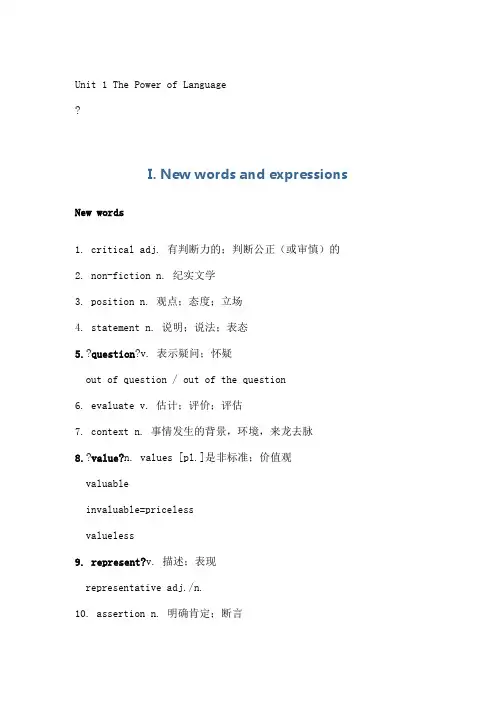
Unit 1 The Power of Language?I. New words and expressions New words1. critical adj. 有判断力的;判断公正(或审慎)的2. non-fiction n. 纪实文学3. position n. 观点;态度;立场4. statement n. 说明;说法;表态5.?question?v. 表示疑问;怀疑out of question / out of the question6. evaluate v. 估计;评价;评估7. context n. 事情发生的背景,环境,来龙去脉8.?value?n. values [pl.]是非标准;价值观valuableinvaluable=pricelessvalueless9. represent?v. 描述;表现representative adj./n.10. assertion n. 明确肯定;断言11. sufficient?adj.?足够的;充足的sufficiencyinsufficient12. statistic n. statistics [pl.]统计数字;统计资料13. integrate v.(使)合并,成为一体14. authority?n.专家;学术权威;泰斗an/the authority on sth.authorize15. compare?v. 比较;对比compare A with Bcompare A to B16. subject n. 主题;题目;题材17. consistent adj. 相符的;符合的18. inconsistency n. 不一致19. assumption n. 假定;假设20. case?n. 具体情况;事例in casein case of firein case that…a case in pointconfirmed/suspected cases21. directly adv. 直接地;径直地22. identify v. 找到;发现23. valid?adj. 符合逻辑的;合理的;确凿的validity n. 有效性,正确(性)invalid24. credible?adj. 可信的;可靠的incredible=unbelievable25. landmark n.(标志重要阶段的)里程碑26. relevant?adj. 紧密相关的;切题的relevancy n. 关联;恰当irrelevant27. current adj. 现时发生的;当前的28. appropriate?adj. 合适的;恰当的inappropriateIt's (not) appropriate that ….29. bias n. 偏见;偏心;偏向30. considerably?adv. 非常;很;相当多地considerconsideringconsiderableconsiderateconsideration31. Democrat n. (美国)民主党党员,民主党支持者民32. Republican n. (美国)共和党党员,共和党支持者33. reflect v. 显示;表明;表达34. informed?adj. 有学问的;有见识的well-informedill-informedPhrases and Expressions1. apply to 使用;应用2. put forth 提出;产生3. take … into account 考虑到;顾及4. accept/take … at face value 相信表面;信以为真5. with a grain of salt 有保留地;持怀疑态度地II. Text LearningCritical Reading①?(1)Critical reading?applies to?non-fiction writing?in which?the author?puts forth a position?or seeks to make a statement.?Critical reading is active reading. It involves more than just(不只是,不仅仅是) understanding what an author is saying. Critical reading involves questioning and evaluating what the author is saying, and forming your own opinions about what the authoris saying.?Here are the things you should do to be a critical reader.(启下句)本部分重点及难点:1. Critical reading?applies to?non-fiction writing?in which?the author?puts forth a position?or seeks to make a statement.apply to sb./sth.= be applicable to sb./sth.apply的派生词:application, applicant, applicable②?Consider the context of what is written. You may be reading something that was written by an author from a different cultural context?than?yours.?(2)Or, you may be reading something written?some time?ago in a different time context than yours.?(3)In either case, you must recognize and take into account any differences between your values and attitudes and those represented by the author.?本部分重点及难点:2. Or, you may be reading something written?some time?ago in a different time context than yours.some time注意区分:sometime / sometimes / some times3.?In either case, you must recognize and?take into account?any differences between your?values andattitudes?and?those?represented by the author. 不论哪种情况,你必须注意并考虑你的价值观和态度与作者所述的价值观和态度有何不同。
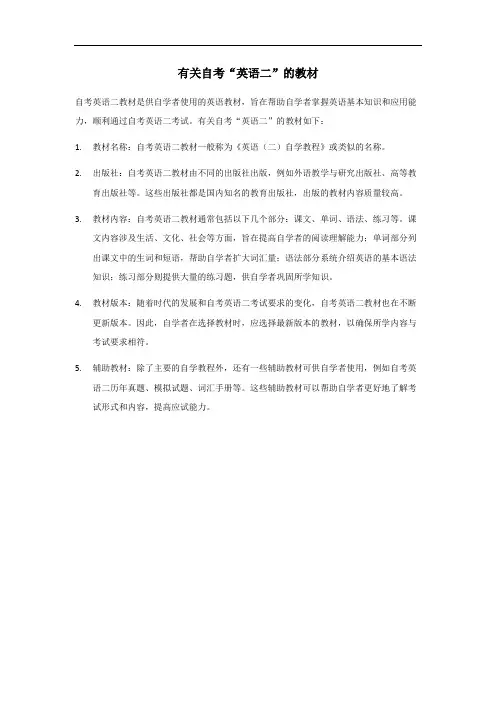
有关自考“英语二”的教材
自考英语二教材是供自学者使用的英语教材,旨在帮助自学者掌握英语基本知识和应用能力,顺利通过自考英语二考试。
有关自考“英语二”的教材如下:
1.教材名称:自考英语二教材一般称为《英语(二)自学教程》或类似的名称。
2.出版社:自考英语二教材由不同的出版社出版,例如外语教学与研究出版社、高等教
育出版社等。
这些出版社都是国内知名的教育出版社,出版的教材内容质量较高。
3.教材内容:自考英语二教材通常包括以下几个部分:课文、单词、语法、练习等。
课
文内容涉及生活、文化、社会等方面,旨在提高自学者的阅读理解能力;单词部分列出课文中的生词和短语,帮助自学者扩大词汇量;语法部分系统介绍英语的基本语法知识;练习部分则提供大量的练习题,供自学者巩固所学知识。
4.教材版本:随着时代的发展和自考英语二考试要求的变化,自考英语二教材也在不断
更新版本。
因此,自学者在选择教材时,应选择最新版本的教材,以确保所学内容与考试要求相符。
5.辅助教材:除了主要的自学教程外,还有一些辅助教材可供自学者使用,例如自考英
语二历年真题、模拟试题、词汇手册等。
这些辅助教材可以帮助自学者更好地了解考试形式和内容,提高应试能力。
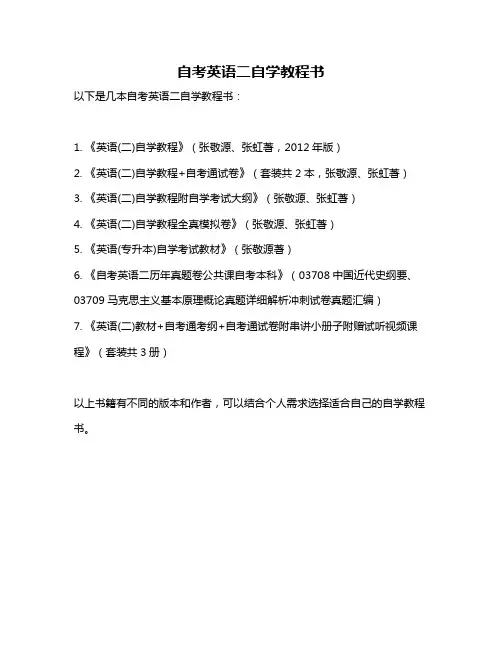
自考英语二自学教程书
以下是几本自考英语二自学教程书:
1. 《英语(二)自学教程》(张敬源、张虹著,2012年版)
2. 《英语(二)自学教程+自考通试卷》(套装共2本,张敬源、张虹著)
3. 《英语(二)自学教程附自学考试大纲》(张敬源、张虹著)
4. 《英语(二)自学教程全真模拟卷》(张敬源、张虹著)
5. 《英语(专升本)自学考试教材》(张敬源著)
6. 《自考英语二历年真题卷公共课自考本科》(03708中国近代史纲要、03709马克思主义基本原理概论真题详细解析冲刺试卷真题汇编)
7. 《英语(二)教材+自考通考纲+自考通试卷附串讲小册子附赠试听视频课程》(套装共3册)
以上书籍有不同的版本和作者,可以结合个人需求选择适合自己的自学教程书。
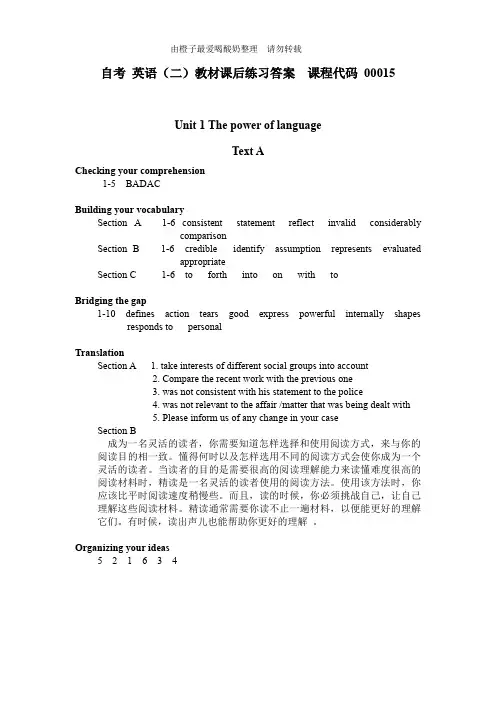
自考英语(二)教材课后练习答案课程代码00015Unit 1 The power of languageText AChecking your comprehension1-5 BADACBuilding your vocabularySection A 1-6 consistent statement reflect invalid considerablycomparisonSection B 1-6 credible identify assumption represents evaluatedappropriateSection C 1-6 to forth into on with toBridging the gap1-10 defines action tears good express powerful internally shapes responds to personalTranslationSection A 1. take interests of different social groups into account2. Compare the recent work with the previous one3. was not consistent with his statement to the police4. was not relevant to the affair /matter that was being dealt with5. Please inform us of any change in your caseSection B成为一名灵活的读者,你需要知道怎样选择和使用阅读方式,来与你的阅读目的相一致。
懂得何时以及怎样选用不同的阅读方式会使你成为一个灵活的读者。
当读者的目的是需要很高的阅读理解能力来读懂难度很高的阅读材料时,精读是一名灵活的读者使用的阅读方法。
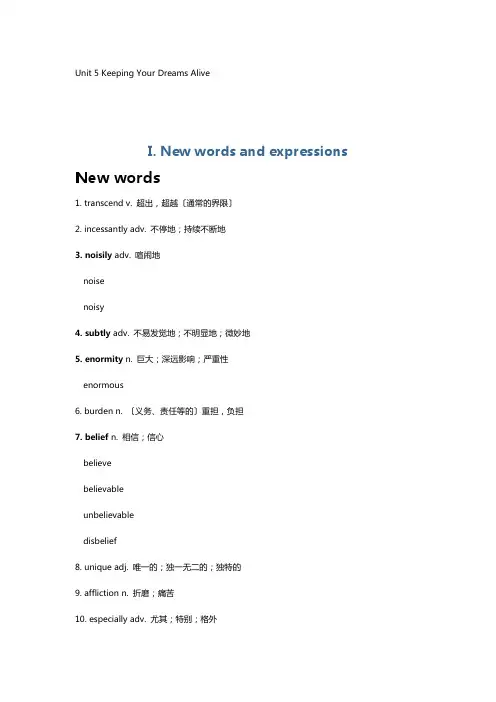
Unit 5 Keeping Your Dreams AliveI. New words and expressions New words1. transcend v. 超出,超越〔通常的界限〕2. incessantly adv. 不停地;持续不断地3. noisily adv. 喧闹地noisenoisy4. subtly adv. 不易发觉地;不明显地;微妙地5. enormity n. 巨大;深远影响;严重性enormous6. burden n. 〔义务、责任等的〕重担,负担7. belief n. 相信;信心believebelievableunbelievabledisbelief8. unique adj. 唯一的;独一无二的;独特的9. affliction n. 折磨;痛苦10. especially adv. 尤其;特别;格外11. tribe n. 部落12. species n. 种,物种〔分类上小于属〕13. discipline n. 自制力;遵守纪律14. confront v. 处理,解决〔问题或困境〕15. evoke v. 引起,唤起〔感情、记忆或形象〕16. grief n. 〔尤指因某人去世引起的〕悲伤,悲哀,伤心17. guilt n. 内疚;悔恨guiltybe guilty ofbe / feel guilty about18. anxiety n. 焦虑;忧虑anxious19. anguish n. 剧痛;极度痛苦;苦恼20. despair n. 绝望21. uncomfortable adj.〔使〕焦虑的,为难的,害怕的,不自在的22. physical adj. 身体的;肉体的;躯体的23. equal v. 比得上;敌得过24. conflict n. 冲突;争执;争论25. engender v. 产生,引起〔某种感觉或情况〕26. pose v. 造成〔威胁、问题等〕;引起;产生27. distinguish v. 区分;区分;分清28. wisdom n. 智慧;才智;精明29. mentally adv. 精神上;智力上;思想上30. spiritually adv. 精神上;心灵上31. desire v. 渴望;期望32. deliberately adv. 成心;蓄意;存心33. instruct v. 教授;指导34. dread v. 非常害怕;极为担忧Phrases and Expressions1. moan about 抱怨2. a series of 系列;连续3. because of 因为4. as well as 除…之外5. cutting edge〔处于某事物开展的〕尖端,最前沿,领先阶段6. call forth 引起;使产生II. Text LearningLife Is Difficult①Life Is Difficult.②This is a great truth, one of the greatest truths. It is a great truth because once we truly see this truth we transcend it. Once we truly know that life is difficult-once we truly understand and accept it-then life is no longer difficult. Because once it is accepted, the fact that life is difficult no longer matters.〔承上句〕③Most people do not fully see this truth that life is difficult.④Instead they moan more or less incessantly, noisily or subtly, about the enormity of their problems, their burdens, and their difficulties as if life were generally easy, as if life should be easy. (1)They voice their belief, noisily or subtly, that their difficulties represent a unique kind of affliction that should not be and that has somehow been especially visited upon them, or else upon their families, their tribe, their class, their nation, their race or even their species, and not upon others. I know about this moaning because I have done my share.〔承上、总结的句子〕本局部重点及难点:1. They voice their belief, noisily or subtly, that their difficulties represent a unique kind of affliction that should not be and that has somehow been especially visited upon them, or else upon their families, their tribe, their class, their nation, their race or even their species, and not upon others.visit sth. on / upon sb./sth. 〔古〕inflict〔造成,使遭受〕punishment on sb./sth. 对某人/某物进行惩罚visit the sins of the parents upon their children相当于make the children suffer for their parent's failings 使子女因父母之过错而受惩罚⑤Life is a series of problems. Do we want to moan about them or solve them? Do we want to teach our children to solve them?⑥ Discipline is the basic set of tools we require to solve life's problems.〔主题句〕Without discipline we can solve nothing. With only some discipline we can solve only some problems. With total discipline we can solve all problems.⑦What make life difficult is that the process of confronting and solving problems is apainful one. Problems, depending upon their nature, evoke in us frustration of grief, sadness, loneliness, guilt, regret, anger, fear, anxiety, anguish, despair. These are uncomfortable feelings, often very uncomfortable, often as painful as any kind of physical pain, sometimes equaling the very worst kind of physical pain. (2)Indeed, it is because of the pain that events or conflicts engender in us all that we call them problems.〔承上启下句〕(3)And since life poses an endless series of problems, life is always difficult and is full of pain as well as joy.本局部重点及难点:2. Indeed, it is because of the pain that events or conflicts engender in us all that we call them problems. 强调句。
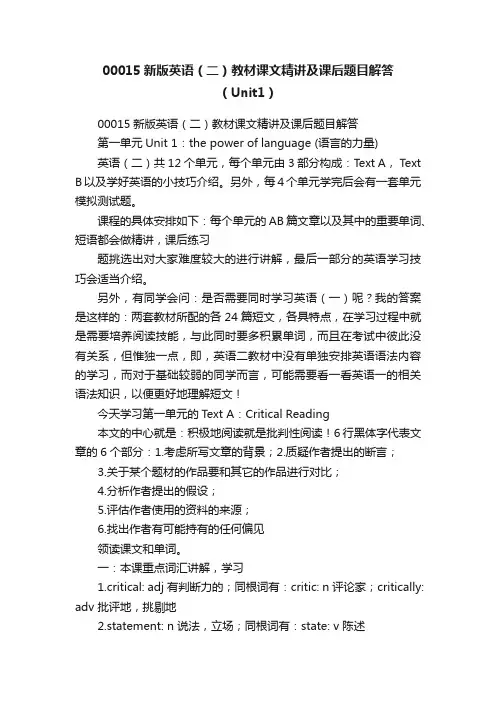
00015新版英语(二)教材课文精讲及课后题目解答(Unit1)00015新版英语(二)教材课文精讲及课后题目解答第一单元Unit 1:the power of language (语言的力量)英语(二)共12个单元,每个单元由3部分构成:T ext A, Text B以及学好英语的小技巧介绍。
另外,每4个单元学完后会有一套单元模拟测试题。
课程的具体安排如下:每个单元的AB篇文章以及其中的重要单词、短语都会做精讲,课后练习题挑选出对大家难度较大的进行讲解,最后一部分的英语学习技巧会适当介绍。
另外,有同学会问:是否需要同时学习英语(一)呢?我的答案是这样的:两套教材所配的各24篇短文,各具特点,在学习过程中就是需要培养阅读技能,与此同时要多积累单词,而且在考试中彼此没有关系,但惟独一点,即,英语二教材中没有单独安排英语语法内容的学习,而对于基础较弱的同学而言,可能需要看一看英语一的相关语法知识,以便更好地理解短文!今天学习第一单元的Text A:Critical Reading本文的中心就是:积极地阅读就是批判性阅读!6行黑体字代表文章的6个部分:1.考虑所写文章的背景;2.质疑作者提出的断言;3.关于某个题材的作品要和其它的作品进行对比;4.分析作者提出的假设;5.评估作者使用的资料的来源;6.找出作者有可能持有的任何偏见领读课文和单词。
一:本课重点词汇讲解,学习1.critical: adj 有判断力的;同根词有:critic: n 评论家;critically: adv 批评地,挑剔地2.statement: n 说法,立场;同根词有:state: v 陈述如:1). We were not surprised by their statement that the train services would be reduced.2). Clearly state your address and telephone number.3.evaluate: v 评估、评价;同根词有:evaluation: n4.assertion: n 断言;动词形式:assert5.sufficient: adj 足够的,充足的(= enough), 同根词有:sufficiency: ninsufficient: adj 不充足的。
Unit 6 The Value of MoneyI. New words and expressions New words1. stationery n.文具同音词:stationary2.fare n. 车资;船费;飞机票价3.lump sum n. 一次总付的钱款4.recess n. 课间歇息,5.allocate v. 拨(给);划(给);分派(给)6.overspendv. 花费过多;比(估计的)花得多;超支注意 over- / out-的差别:overeat outeatoverdo outdooversleep outliveoverweight outshine7.opt v. 选择;精选optionoptional8.constraint n. 限制;限制;拘束9.budget v. 慎重花费;把?编入估算10. overindulge v.过多地享受(尤指食品或饮料)11. short-sighted adj.眼光溜浅的;没有远见的12.mentality n. 心态;思想状况;思想方法13.sibling n. 兄;弟;姐;妹14. indulge v. 沉沦,沉浸,沉迷(于?)15.rationing n. 定量配给政策;配给制16.principle n. 观点;(行动、思想的)原因,信条同音词: principal17. unnecessarily adv.没必需地18. differentiate v.划分;差别;鉴别differdifferentdifference19.inculcate v. 频频灌注;谆谆教诲20.resist v. 忍住;抵抗resistance resistant21. temptationn.引诱;迷惑22.scheme n. 计划;方案;系统;系统23.formation n. 构成;形成24. kindergarten n.少儿园25. monthly adj.按月结算的;有效期为一个月的dailyweeklybiweeklymonthlyquarterlyyearlyPhrases and Expressions1. on a daily basis每天地2. result in致使3. pay off付清;偿清4. within one's means量力而行5. stand ? in good stead (需要时)对某人实用,对某人有益II. Text Learning Teaching Children to Spend Pocket MoneyWisely① School-going children need pocket money for food,stationery and bus fares. Parents give pocket money to their children in different ways . Some give a lump sum at the beginning of a month or a week. Others prefer to give pocket money on adaily basis. (1)The way in which pocket money is given affects how money is spent orsaved. (承前启后的句子)On the other hand, the children'sspend ing habitsmay affect how pocket money is given .②(2) Pocket money given on a daily basis is sometimes termed as "foodmoney".Children usually use the pocket money to buy food during recess and also at lunch hour if they have school activities in the afternoon. They learn how tomanage small sums of money. As the money is limited, they have to control theirspending. (承前启后的句子)(3) Some parents choose this method of allocating pocket money in order to prevent their children from overspending , hoping that in time theycan be trusted with larger sums of money.Parents who earn daily wages may also opt for this due to financial constraints.(承上句)本部分要点及难点:1. The way in which pocket money is given affects how money is spent or saved.(1) the way (in which / that) sb. does sth.(参照 Unit 2, Text A)the way (in which / that) sth. is done(2)句子的骨干是: The way affects how money is spent or saved.2.Pocket money given on a daily basis is sometimes termed as"food money".(1) given on a daily basis过去分词短语作定语(2) be termed as被称为?3.Some parents choose this method of allocating pocket money in orderto prevent their children from overspending, hoping that in time they can be trusted with larger sums of money.(1)句子的骨干是Some parents choose this method in order to prevent theirchildren from overspending.prevent sb. from doing sth.与keep sb. from doing sth.同样,但前者from能够省略,后者不可以省略。
以下是考研英语二教材参考书目:
* 《考研英语写作》。
该书由中国著名语言学家李伟主编,是备考考研英语二写作部分的首选。
它涵盖了考研英语写作的各个方面,如写作思路、结构、论据选取、衔接、句式等,并提供了大量的例句和范文,以帮助考生更好地掌握英语写作的技巧和方法。
* 《考研英语词汇》。
该书由全国著名的教育学者周淑怡和商务印书馆编写,包含了考研英语二所需的3500个高频词汇。
它还通过丰富的例句、实用的征解法和精彩的典故故事来帮助考生更好地记忆词汇。
* 《句句真研》。
这是一本语法书,适合英语基础较弱的同学使用,可以帮助大家从基础语法入手,逐步提高英语水平。
* 《考研真相》。
这是一本真题书,通过对历年真题的详细解析,帮助考生了解考试重点和难点,并提供了一些解题技巧和方法。
此外,还有《红宝书考研英语词汇》、《考研圣经》等也是考研英语二的参考书目。
总之,考生在备考时,应该选择适合自己的参考书目,并制定科学合理的复习计划,才能取得好的成绩。
译林英语二年级一、教材介绍译林英语是一套专为中国小学生设计的英语教材系列。
本文档将介绍译林英语二年级的教材内容及其特点。
二、教材内容1.单元主题:译林英语二年级的教材共分为十个单元,每个单元的主题丰富多样,涵盖生活、学校、家庭、动物、食物、节日等方面的内容。
例如,第一单元的主题是“Hello”,学生将学习简单日常用语及问候语,培养基本的交际能力。
2.听力材料:每个单元的课文都有配套的听力材料,通过听力训练,学生能够更好地理解并掌握重要的语音、语调和语速等方面的知识。
3.课文内容:每个单元的课文由生活化的对话、短文和歌曲组成。
教材注重培养学生的实际口语应用能力,通过情境化的故事情节,激发学生学习英语的兴趣。
4.语法知识:教材中融入适合二年级学生学习的简单语法知识,如时态、名词变复数、代词等。
通过语法练习,帮助学生巩固所学的知识点。
5.阅读理解:每个单元的课后均有与课文相关的阅读理解题目,帮助学生提高理解和运用英语的能力。
三、教材特点1.趣味性:译林英语二年级的教材注重激发学生的学习兴趣,通过生活化的情境和有趣的故事,让学生在轻松愉快的学习氛围中掌握英语知识。
2.循序渐进:教材内容按照难易程度逐步展开,适应学生的学习能力和语言水平的提高,帮助学生逐步建立英语语言体系。
3.听说读写全面发展:教材注重培养学生的听、说、读、写四个方面的能力。
通过听力和口语练习,提高学生的听力理解和口头表达能力;通过阅读和写作练习,培养学生的阅读理解和书写能力。
4.灵活多样的教学方法:教材内容设计灵活多样,包括听力训练、口语对话、课文朗读、角色扮演等,旨在通过多种方式培养学生的英语综合运用能力。
5.培养跨文化意识:教材特别注重中国文化和西方文化的融合,通过学习英语,帮助学生了解和理解不同文化之间的差异,培养跨文化交流的意识。
四、教学建议1.学生需要充分利用教材中的听力材料,通过反复听、模仿和跟读,提高自己的英语听力和口语水平。
英语二教材英语二教材是一本为学习英语的学生设计的教材。
它涵盖了英语语法、词汇、听力、口语和阅读等方面的内容。
在这本教材中,学生可以通过学习各种不同的课文和练习来提高他们的英语能力。
首先,英语二教材包含了一系列的语法练习。
这些练习旨在帮助学生巩固他们对英语语法规则的理解和应用。
学生可以通过这些练习来学习如何正确使用不同的时态、语态和句式。
此外,教材还提供了一些练习来帮助学生理解和运用语法规则,例如句子改写、填空和语法错误改正等。
其次,英语二教材也包含了大量的词汇练习。
学生可以通过学习教材中的词汇表和词汇练习来扩展他们的词汇量。
这些练习旨在帮助学生学习如何正确拼写、发音和运用各种不同的词汇。
通过这些练习,学生可以提高他们的词汇掌握能力,使他们能够更自信地运用英语进行沟通和写作。
此外,英语二教材还注重听力和口语的培养。
学生可以通过听教材中的录音材料来提高他们的听力理解能力。
同时,教材还提供了一些口语练习,例如对话和口语表达练习,帮助学生提高他们的口语表达能力和交流能力。
这些练习旨在帮助学生提高他们的听说能力,使他们能够更自如地与他人进行英语交流。
最后,英语二教材还包含了一些阅读理解练习。
学生可以通过阅读不同难度的文章来提高他们的阅读理解能力。
教材中的文章涵盖了各种不同的主题,包括科学、历史、文化和社会等。
通过阅读这些文章,学生可以扩展他们的知识面,提高他们的阅读理解能力和阅读速度。
总的来说,英语二教材提供了全面的英语学习资源,涵盖了语法、词汇、听力、口语和阅读等方面的内容。
通过学习这本教材,学生可以提高他们的英语能力,使他们能够更自信地运用英语进行交流和写作。
同时,教材中的各种练习也可以帮助学生巩固他们所学的知识,并提高他们的学习效果。
Unit 1Text AI 1-5 B A D A BII Section A1.consistent2.statement3.reflect4.invalid5.considerableparisonSection B1.credible.2.identify3.assumption4.represents5.evaluated6.appropriateSection C1.to2.forward3.into4.in5.with6.toIII 1-5 define action tears good express6-10 powerful internally respond to shapes personalIV Section A1.take different social groups into accountparing his present work with the previous work,3.is inconsistent with what he told the policeman4.is not relevant to what we’re dealing withrm us of any of your changesSection B要成为一个灵活的读者,你必须知道如何根据你的阅读目的选择并使用恰当的阅读方式。
知道何时,如何使用不同的阅读风格能使你成为一个灵活的读者。
研究型阅读是灵活的读者为了深度理解偏难的题材时所使用的阅读风格。
当使用此种阅读风格时,你的阅读速度要比平时慢一些。
而且,你要挑战自我,以理解原文。
并且,它还常常需要你阅读不止一遍以深度理解。
有时候,大声朗读也可以加深理解。
V 52134Text BI Section A1-6 Y F Y F Y NGSection B1.Mastering our language2.our lives and destinies3.determination4.power5.live whatever life you desire6.some alternativesII Section A1.confidence2.creative3.eliminate4. dramatically5.significant6.limitSection B1.matter2. commonly3. pleased4. infinitemand6.impactSection C1.out2.Seems3. on4. within5. in6. overIII Section A1.have a great impact on the country’s future.2.but it matters a lot to me3.but the police is soon in control of the situation4.i have on alternative but let you go5.The final decision is up to the managerSection B职场中,英语具有重要的作用。
自考英语二教材答案讲解1、Since we have _____ money left,we can't afford the expensive computer. [单选题] *A. a littleB. a fewC. little(正确答案)D. few2、______ pocket money did you get when you were a child? ()[单选题] *A. WhatB. HowC. How manyD. How much(正确答案)3、I usually read English _______ six o’clock _______ six thirty in the morning. [单选题] *A. from;?atB. from; to(正确答案)C. at; atD. at; to4、( ) ____ eye exercises ___ good __ your eyes. [单选题] *A. Doing, is, for(正确答案)B. Doing, are, forC. Do, is, forD. Do, are, at5、—______? —Half a kilo.()[单选题] *A. How much are theyB. How much is itC. How much would you like(正确答案)D. How many would you like6、He used to get up at six in the morning,()? [单选题] *A. used heB. did heC. didnt he (正确答案)D. should he7、This seat is vacant and you can take it. [单选题] *A. 干净的B. 没人的(正确答案)C. 舒适的D. 前排的8、I like booking tickets online,because it is _______. [单选题] *A. boringB. confidentC. convenient(正确答案)D. expensive9、They lost their way in the forest, and _____ made matters worse was night began to fall. [单选题] *A. thatB. itC. what(正确答案)D. which10、Seldom _____ in such a rude way. [单选题] *A.we have been treatedB. we have treatedC. have we been treated(正确答案)D. have treated11、--Which is Tom?--He is _______ of the two boys. [单选题] *A. tallB. tallerC. the taller(正确答案)D. the tallest12、—Why do you look so ______?—Our team won the basketball match!()[单选题] *A. angryB. excited(正确答案)C. nervousD. unfair13、Taking the subway is quite fast and cheap. It can _______ both time and money. [单选题] *A. savesB. save(正确答案)C. earnD. use14、I knocked on the door but _______ answered. [单选题] *A. somebodyB. anybodyC. nobody(正确答案)D. everybody15、John and Jack had looked for the key, but _____ of them found it. [单选题] *A. noneB. neither(正确答案)C. bothD. either16、Boys and girls, please _______ your favorite book here and show it to us next class. [单选题] *A. bring(正确答案)B. sellC. buyD. take17、_________ along the old Silk Road is an interesting and rewarding experience. [单选题]*A. TravelB. Traveling(正确答案)C. Having traveledD. Traveled18、Marie is a _______ girl.She always smiles and says hello to others. [单选题] *A. shyB. friendly(正确答案)C. healthyD. crazy19、33.Body language is even___________ and ___________ than any other language. [单选题] *A.stronger, loudB.strong, louderC.strong, loudD.stronger, louder (正确答案)20、I am so excited to receive a _______ from my husband on my birthday. [单选题] *A. present(正确答案)B. percentC. parentD. peace21、35.Everyone in China ______ Mid-Autumn Day. [单选题] * A.likes(正确答案)B.likeC.is likingD.are like22、The office building will be _______ a library. [单选题] *A. turned onB. turned upC. turned into(正确答案)D. turned off23、Was()that I saw last night at the concert? [单选题] *A. it you(正确答案)B. not youC. youD. that yourself24、We need a _______ when we travel around a new place. [单选题] *A. guide(正确答案)B. touristC. painterD. teacher25、When you are tired, listen to music and try to _______ yourself. [单选题] *A. supportB. showC. playD. relax(正确答案)26、The city is famous _______ its beautiful scenery. [单选题] *A. for(正确答案)B. ofC. asD. to27、--What’s the weather like today?--It’s _______. [单选题] *A. rainB. windy(正确答案)C. sunD. wind28、Helen is new here, so we know _______ about her. [单选题] *A. somethingB. anythingC. everythingD. nothing(正确答案)29、So many people will _______ to their work after the Spring Festival. [单选题] *A. get inB. get onC. get offD. get back(正确答案)30、The strawberries ______ fresh. Can I taste (品尝) one?()[单选题] *A. watchB. tasteC. soundD. look(正确答案)。
0015 (英语二)UNIT:01-A. What Is a Decision?A decision is a choice made from among alternative courses of action that are available. The purpose of m aking a decision is to establish and achieve organizational goals and objectives. The reason for making a deci sion is that a problem exists, goals or objectives are wrong, or something is standing in the way of accomplis hing them.Thus the decision-making process is fundamental to management. Almost everything a manager does involv es decisions, indeed, some suggest that the management process is decision making. Although managers cann ot predict the future, many of their decisions require that they consider possible future events. Often man agers must make a best guess at what the future will be and try to leave as little as possible to chance, hut since uncertainty is always there, risk accompanies decisions. Sometimes the consequences of a poor decisio n are slight; at other times they are serious.Choice is the opportunity to select among alternatives. If there is no choice, there is no decision to be ma de. Decision making is the process of choosing, and many decisions have a broad range of choice. For exampl e, a student may be able to choose among a number of different courses in order to implement the decision to obtain a college degree. For managers, every decision has constraints based on policies, procedures, laws, precedents, and the like. These constraints exist at all levels of the organization.Alternatives are the possible courses of action from which choices can be made. If there are no alternati ves, there is no choice and, therefore, no decision. If no alternatives are seen, often it means that a thorou gh job of examining the problems has not been done. For example, managers sometimes treat problems in an either/or fashion; this is their way of simplifying complex problems. But the tendency to simplify blinds the m to other alternatives.At the managerial level, decision making includes limiting alternatives as well as identifying them, and the range is from highly limited to practically unlimited.be made fromDecision makers must have some way of determining which of several alternatives is best -- that is, which contributes the most to the achievement of organizational goals. An organizational goal is an end or a state of affairs the organization seeks to reach. Because individuals (and organizations) frequently have different ideas about how to attain the goals, the best choice may depend on who makes the decision. Frequently, dep artments or units within an organization make decisions that are good for them individually but that are less than optimal for the larger organization. Called suboptimization, this is a trade-off that increases the adva ntages to one unit or function but decreases the advantages to another unit or function. For example, the m arketing manager may argue effectively for an increased advertising budget. In the larger scheme of things, however, increased funding for research to improve the products might be more beneficial to the organizat ion.These trade-offs occur because there are many objectives that organizations wish to attain simultaneous ly. Some of these objectives are more important than others, but the order and degree of importance often vary from person to person and from department to department. Different managers define the same probl em in different terms. When presented with a common case, sales managers tend to see sales problems, pro duction managers see production problems, and so on.The ordering and importance of multiple objectives is also based, in part, on the values of the decision ma ker. Such values are personal; they are hard to understand, even by the individual, because they are so dyna mic and complex. In many business situations different people's values about acceptable degrees of risk and profitability cause disagreement about the correctness of decisions.People often assume that a decision is an isolated phenomenon. But from a systems point of view, problem s have multiple causes, and decisions have intended and unintended consequences. An organization is an ongoi ng entity, and a decision made today may have consequences far into the future. Thus the skilled manager lo oks toward the future consequences of current decisions.UNIT: 01-B. Secrets of Success at an InterviewThe subject of today's talk is interviews.The key words here are preparation and confidence, which will carry you far.Do your homework first.Find out all you can about the job you are applying for and the organization you hope to work for.Many of the employers I interviewed made the same criticism of candidates. "They have no idea what the da y to day work of the job brings about. They have vague notions of "furthering the company's prosp ects’ or o f 'serving the community', but have never taken the trouble to find out the actual tasks they will be require d to do.”Do not let this be said of you. It shows an unattractive indifference to your employer and to your job.Take the time to put yourself into the interviewer's place. He wants somebody who is hard-working with a pl easant personality and a real interest in the job.Anything that you find out about the prospective employer can be used to your advantage during the intervi ew to show that you have bothered to master some facts about the people who you hope to work for.Write down (and remember) the questions you want to ask the interviewer(s) so that you are not speechless when they invite your questions. Make sure that holidays and pay are not the first things you ask about. If al l your questions have been answered during the interview, reply: "In fact, I did have several questions, but y ou have already answered them all.”Do not be afraid to ask for clarification of something that has been said during the interviewif you want to be sure what was implied, but do be polite.Just before you go to the interview, look again at the original advertisement that you answered, any corresp ondence from your prospective employer, photocopies of your letter of application or application form and y our resume.Then you will remember what you said and what they want. This is very important if you have applied for man y jobs in a short time as it is easy to become confused and give an impression of inefficiency.Make sure you know where and when you have to report for the interview. Go to the building (but not inside the office) a day or two before, if necessary, to find out how long the journey takes and where exactly the place is.Aim to arrive five or ten minutes early for the actual interview, then you will have a little time in hand and y ou will not panic if you are delayed. You start at a disadvantage if you arrive worried and ten minutes late.Dress in clean, neat, conservative clothes. Now is NOT the time to experiment with the punk look or (girls) t o wear low-cut dresses with miniskirts. Make sure that your shoes, hands and hair (and teeth) are clean and neat.Have the letter inviting you for an interview ready to show in case there is any difficulty in communication.You may find yourself facing one interviewer or a panel. The latter is far more intimidating, but do not let it worry you too much. The interviewer will probably have a table in front ofhim/her. Do not put your things or arms on it.If you have a bag or a case, put it on the floor beside your chair. Do not clutch it nervously or, worse still, d rop it, spilling everything.Shake hands if the interviewer offers his hand first. There is little likelihood that a panel of five wants to g o though the process of all shaking hands with you in turn. So you do not be upset if no one offers.Shake hands firmly -- a weak hand suggests a weak personality, and a crushing grip is obviously painful. Do no t drop the hand as soon as yours has touched it as this will seem to show you do not like the other person. Speak politely and naturally even if you are feeling shy. Think before you answer any questions.If you cannot understand, ask: "Would you mind rephrasing the question, please?" The question will then be r epeated in different words.If you are not definitely accepted or turned down on the spot, ask: "When may I expect to hear the results of this interview?"If you do receive a letter offering you the job, you must reply by letter (keep a photocopy) as soon as possi ble.UNIT: 02-A. Black HolesWhat is a black hole? Well, it's difficult to answer this question, since the terms we would normally use to d escribe a scientific phenomenon are inadequate here. Astronomers and scientists think that a black hole is a region of space (not a thing ) into which matter has fallen and from which nothing can escape ?not even ligh t. So we can't see a black hole. A black hole exerts a strong gravitational pull and yet it has no matter. It is only space -- or so we think. How can this happen?The theory is that some stars explode when their density increases to a particular point; they collapse and s ometimes a supernova occurs. From earth, a supernova looks like a very bright light in the sky which shines e ven in the daytime. Supernovae were reported by astronomers in the seventeenth and eighteenth centuries. Some people think that the Star of Bethlehem could have been a supernova. The collapse of a star may produce a White Dwarf or a neutron star -- a star, whose matter is so dense that it continually shrinks by the fo rce of its own gravity. But if the star is very large (much bigger than our sun) this process of shrinking may be so intense that a black hole results. Imagine the earth reduced to the size of a marble, but still having th e same mass and a stronger gravitational pull, and you have some idea of the force of a black hole. Any matt er near the black hole is sucked in. It is impossible to say what happens inside a black hole. Scientists have c alled the boundary area around the hole the "event horizon." We know nothing about events which happen on ce objects pass this boundary. But in theory, matter must behave very differently inside the hole.For example, if a man fell into a black hole, he would think that he reached the center of it very quickly. Ho wever an observer at the event horizon would think that the man never reached the center at all. Our space and time laws don't seem to apply to objects in the area of a black hole. Einstein's relativity theory is the o nly one which can explain such phenomena. Einstein claimed that matter and energy are interchangeable, so t hat there is no "absolute" time and space. There are no constants at all, and measurements of time and spac e depend on the position of the observer. They are relative. We do not yet fully understand the implications of the relativity theory; but it is interesting that Einstein's theory provided a basis for the idea of black ho les before astronomers started to find some evidence for their existence. It is only recently that astronom ers have begun specific research into black holes. In August 1977, a satellite was launched to gather data ab out the 10 million black holes which are thought to be in the Milky Way. And astronomers are planning a new observatory to study the individual exploding stars believed to be black holes,The most convincing evidence of black holes comes frown research into binary star systems. Binary stars, as their name suggests, are twin stars whose position in space affects each other. In some binary systems, astronomers have shown that the re is an invisible companion star, a "partner" to the one which we can see in the sky. Matter from the one wh ich we can see is being pulled towards the companion star. Could this invisible star, which exerts such a grea t force, be a black hole? Astronomers have evidence of a few other stars too, which might have black holes as companions.The story of black holes is just beginning. Speculations about them. are endless. There might be a massive bl ack hole at the center of our galaxy swallowing up stars at a very rapid rate. Mankind may one day meet this fate. On the other hand, scientists have suggested that very advanced technology could one day make use of the energy of black holes for mankind. These speculations sound like science fiction. But the theory of blac k holes in space is accepted by many serious scientists and astronomers. They show us a world which operate s in a totally different way from our own and they question our most basic experience of space and time. UNIT: 02-B. Worlds within WorldsFirst of all let us consider the earth (that is to say, the world) as a planet revolving round the sun. The eart h is one of nine planets which move in orbit round the sun. These nine planets, together with the sun, make u p what is called our solar system. How this wonderful system started and what kept it working with such won derful accuracy is largely a mystery but astronomers tell us that it is only one of millions of similar systems in space, and one of the smallest.The stars which we see glittering in the sky on a dark and cloudless night are almost certainly the suns of ot her solar systems more or less like our own, but they are so far away in space that it is unlikely that we shall ever get to know very much about them. About our own solar system, however, we are learning more every d ay.Before the American and Russian astronauts made their thrilling journeys into outer space it was difficult f or us to realise what our earth looked like from hundreds of thousands of miles away, but the photographs which the astronauts were able to take show us the earth in space looking not very different from what the moon looks like when we look at it from the earth. The earth is, however, very different from the moon, whi ch the American astronauts have found to be without life or vegetation, whereas our earth is very much aliv e in every respect. The moon, by the way, is called a satellite because it goes round our earth as well as roun d the sun. In other words, it goes round the sun with our earth.The surface of our earth is covered by masses of land and larger areas of water. Let us consider the water areas first. The total water area is about three times as large as the land area. The very large separate are as of water are called "oceans” and the lesser areas are called "seas.”In most of the oceans and seas some of the water is found to be flowing in a particular direction -- that is t o say, from one part towards another part of the ocean or sea concerned. The water which is flowing in this manner is said to be moving as a "current." There are many thousands of currents in the waters of the ocean s and seas, but only certain of the stronger and better marked currents are specially named and of great im portance. These currents are important because they affect the climate of the land areas close to where th ey flow and also because they carry large quantities of microscopic animal and vegetable life which forms a l arge part of the food for fishes.The nature and characteristics of the surface of the land areas of the earth vary a great deal from area to area and from place to place. The surface of some areas consists largely of high mountains and deep valleys whilst, in other areas, most of the surface consists of plains. If one made a journey over the Continents one would find every kind of surface including mountain ranges, plains, plateaux, deserts, tropical forestlands an d empty areas covered permanently byice and snow.When thinking and learning about the world we should not forget that our world is the home of a very great many different people -- peoples with different coloured skins, living very different lives and having very dif ferent ideas about a great many important things such as religion, government, education and social behaviou r.The circumstances under which different people live make a great difference between the way in which the y live and the way in which we live, and it ought to be our business to try to understand those different circ umstances so that we can better understand people of other lands. Above all, we should avoid deciding what we think about people different from ourselves without first having learned a great deal about them and the kind of lives they have to live. It is true to say that the more we learn about other people, the better we un derstand their ideas and,as a rule, the better we like those people themselves.UNIT: 03-A. Euthanasia: For and Against"We mustn't delay any longer ... swallowing is difficult ... and breathing, that's also difficult. Those muscles are weakening too ... we mustn't delay any longer.”These were the words of Dutchman Cees van Wendel de Joode asking his doctor to help him die. Affected w ith a serious disease, van Wendel was no longer able to speak clearly and he knew there was no hope of recov ery and that his condition was rapidly deteriorating.Van Wendel's last three months of life before being given a final, lethal injection by his doctor were filmed and first shown on television last year in the Netherlands. The programme has since been bought by 20 countries and each time it is shown, it starts a nationwide debate on the subject.The Netherlands is the only country in Europe which permits euthanasia, although it is not technically legal t here. However, doctors who carry out euthanasia under strict guidelines introduced by the Dutch Parliament two years ago are usually not prosecuted. The guidelines demand that the patient is experiencing extreme s uffering, that there is no chance of a cure, and that the patient has made repeated requests for euthanasia. In addition to this, a second doctor must confirm that these criteria have been met and the death must be reported to the police department.Should doctors be allowed to take the lives of others? Dr. Wilfred van Oijen, Cees van Wendel's doctor, ex plains how he looks at the question:"Well, it's not as if I'm planning to murder a crowd of people with a machine gun. In that case, killing is the worst thing I can imagine. But that's entirely different from my work as a doctor. I care for people and I tr y to ensure that they don't suffer too much. That's a very different thing.”Many people, though, are totally against the practice of euthanasia. Dr. Andrew Ferguson, Chairman of the o rganisation Healthcare Opposed to Euthanasia, says that "in the vast majority of euthanasia cases, what the patient is actually asking for is something else. They may want a health professional to open up communicati on for them with their loved ones or family -- there's nearly always another question behind the question.”Britain also has a strong tradition of hospices -- special hospitals which care only for the dying and their spe cial needs. Cicely Saunders, President of the National Hospice Council and a founder member of the hospice movement, argues that euthanasia doesn't take into account that there are ways of caring for the dying. Sh e is also concerned that allowing euthanasia would undermine the need for care and consideration of a wide r ange of people: "It's very easy in society now for the elderly, the disabled and the dependent to feel that t hey are burdens, and therefore that they ought to opt out. I think that anything that legally allows the shor tening of life does make those people more vulnerable.”Many find this prohibition of an individual's right to die paternalistic. Although they agree that life is impor tant and should be respected, they feel that the quality of life should not be ignored. Dr. van Oijen believes that people have the fundamental right to choose for themselves if they want to die: "What those people w ho oppose euthanasia are telling me is that dying people haven't the right. And that when people are very ill, we are all afraid of their death. But there are situations where death is a friend. And in those cases, why no t?But "why not?" is a question which might cause strong emotion. The film showing Cees van Wendel's death w as both moving and sensitive. His doctor was clearly a family friend; his wife had only her husband's interest s at heart. Some, however, would argue that it would be dangerous to use this particular example to support the case for euthanasia. Not all patients would receive such a high level of individual care and attention. UNIT: 03-B. Advantage UnfairAccording to the writer Walter Ellis, author of a book called the Oxbridge Conspiracy, Britain is still domina ted by the old-boy network: it isn't what you know that matters, but who you know. He claims that at Oxfor d and Cambridge Universities (Oxbridge for short) a few select people start on an escalator ride which, over the years, carries them to the tops of British privilege and power. His research revealed that the top profe ssions all continue to be dominated, if not 90 per cent, then 60 or 65 per cent, by Oxbridge graduates.And yet, says Ellis, Oxbridge graduates make up only two per cent of the total number of students who grad uate from Britain's universities. Other researches also seem to support his belief that Oxbridge graduates start with an unfair advantage in the employment market. In the law, a recently published report showed tha t out of 26 senior judges appointed to the High Court last year, all of them went to private schools and 21 o f them went to Oxbridge.But can this be said to amount to a conspiracy? Not according to Dr. John Rae, a former headmaster of one of Britain's leading private schools, Westminster:"I would accept that there was a bias in some key areas of British life, but that bias has now gone. Some tim e ago -- in the 60s and before ?entry to Oxford and Cambridge was not entirely on merit. Now, there's abso lutely no question in any objective observer's mind that, entry to Oxford and Cambridge is fiercely competit ive."However, many would disagree with this. For, although over three-quarters of British pupils are educated in state schools, over half the students that go to Oxbridge have been to private, or "public" schools. Is this b ecause pupils from Britain's private schools are more intelligent than those from state schools, or are they simply better prepared?On average, about $ 5,000 a year is spent on each private school pupil, more than twice the amount spent on state school pupils. So how can the state schools be expected to compete with the private schools when the y have far fewer resources? And how can they prepare their pupils for the special entrance exam to Oxford University, which requires extra preparation, and for which many public school pupils traditionally stay at sc hool and do an additional term?Until recently, many blamed Oxford for this bias because of the university's special entrance exam (Cambri dge abolished its entrance exam in 1986). But last February, Oxford University decided to abolish the exam to encourage more state school applicants. From autumn 1996, Oxford University applicants, like applicants t o other universities, will be judged only on their A level results and on their performance at interviews, alth ough some departments might still set special tests.However, some argue that there's nothing wrong in having elite places of learning, and that by their very nat ure, these places should not be easily accessible. Most countries are run by an elite and have centres of aca demic excellence from which the elite are recruited. Walter Ellis accepts that this is true:"But in France, for example, there are something like 40 equivalents of university, which provide this elite t hrough a much broader base. In America you've got the Ivy League, centred on Harvard and Yale, with Princ eton and Stanford and others. But again, those universities together -- the elite universities -- are about te n or fifteen in number, and are being pushed along from behind by other great universities like, for example, Chicago and Berkeley. So you don't have just this narrow concentration of two universities providing a const antly replicating elite.”When it comes to Oxford and Cambridge being elitist because of the number of private school pupils they a ccept, Professor Stone of Oxford University argues that there is a simple fact he and his associates cannot ignore:"If certain schools do better than others then we just have to accept it. We cannot be a place for remedial education. It's not what Oxford is there to do.”However, since academic excellence does appear to be related to the amount of money spent per pupil, this does seem to imply that Prime Minister John Major's vision of Britain as a classless society is still a long wa y off. And it may be worth remembering that while John Major didn't himself go to Oxbridge, most of his m inisters did.UNIT: 04-A. Slavery on Our DoorstepThere are estimated to be more than 20,000 overseas domestic servants working in Britain (the exact figur e is not known because the Home Office, the Government department that deals with this, does not keep st atistics). Usually, they have been brought over by foreign businessmen, diplomats or Britons returning from abroad. Of these 20,000, just under 2,000 are being exploited and abused by their employers, according to a London-based campaigning group which helps overseas servants working in Britain.The abuse can take several forms. Often the domestics are not allowed to go out, and they do not receive an y payment. They can be physically, sexually and psychologically abused. And they can have their passports re moved, making leaving or "escaping" virtually impossible.The sad condition of women working as domestics around the world received much media attention earlier th is year in several highly publicised cases. In one of them, a Filipino maid was executed in Singapore after bei ng convicted of murder, despite protests from various quarters that her guilt had not been adequately esta blished. Groups like Anti-Slavery International say other, less dramatic, cases are equally deserving of atten tion, such as that of Lydia Garcia, a Filipino maid working in London:"I was hired by a Saudi diplomat directly from the Philippines to work in London in 1989. I was supposed to b e paid $ 120 but I never received that amount. They always threatened that they would send me back to my country.”Then there is the case of Kumari from Sri Lanka. The main breadwinner in her family, she used to work for a very low wage at a tea factory in Sri Lanka. Because she found it difficult to feed her four children, she ac cepted a job working as a domestic in London. She says she felt like a prisoner at the London house where sh e worked:"No days off -- ever, no breaks at all, no proper food. I didn't have my own room; I slept on a shelf with a sp ad0 of only three feet above me. I wasn't allowed to talk to anybody. I wasn't even allowed to open the wind ow. My employers always threatened to report me to the Home Office or the police.”At the end of 1994 the British Government introduced new measures to help protect domestic workers fro m abuse by their employers. This included increasing the minimum age of employees to 18, getting employees to read and, understand an advice leaflet, getting employers to agree to provide adequate maintenance and conditions, and to put in writing the main terms and conditions of the job (of which the employees should se e a copy).However, many people doubt whether this will successfully reduce the incidence of abuse. For the main probl em facing overseas maids and domestics who try to complain about cruel living and working conditions is that they do not have independent immigrant status and so cannot change employer. (They are allowed in the Uni ted Kingdom under a special concession in the immigration rules which allows foreigners to bring domestic st aff with them.) So if they do complain, they risk being deported.。